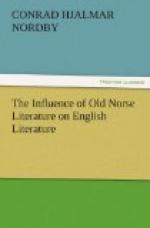“They (the ‘Runic’ odes) have a certain sublime and figurative cast of diction, which is indeed one of their predominant characteristics.... When obvious terms and phrases evidently occurred, the Runic poets are fond of departing from the common and established diction. They appear to use circumlocution and comparisons not as a matter of necessity, but of choice and skill: nor are these metaphorical colourings so much the result of want of words, as of warmth of fancy.” The note gives these examples: “Thus, a rainbow is called, the bridge of the gods. Poetry, the mead of Odin. The earth, the vessel that floats on ages. A ship, the horse of the waves. A tongue, the sword of words. Night, the veil of cares.”
A study of the notes to Warton’s dissertation reveals the fact that he had made use of the books already mentioned in the list on a previous page, and of no others that are significant. But such excellent use was made of them, that it would seem as if nothing was left in them that could be made valuable for spreading a knowledge of and an enthusiasm for Icelandic literature. When it is remembered that Warton’s purpose was to prove the Saracenic origin of romantic fiction in Europe, through the Moors in Spain, and that Icelandic literature was mentioned only to account for a certain un-Arabian tinge in that romantic fiction, the wonder grows that so full and fresh a presentation of Old Norse poetry should have been made. He puts such passages as these into his illustrative notes: “Tell my mother Suanhita in Denmark, that she will not this summer comb the hair of her son. I had promised her to return, but now my side shall feel the edge of the sword.” There is an appreciation of the poetic here, that makes us feel that Warton was not an unworthy wearer of the laurel. He insists that the Saxon poetry was powerfully affected by “the old scaldic fables and heroes,” and gives in the text a translation of the “Battle of Brunenburgh” to prove his case. He admires “the scaldic dialogue at the tomb of Angantyr,” but wrongly attributes a beautiful translation of it to Gray. He quotes at length from “a noble ode, called in the northern chronicles the Elogium of Hacon, by the scald Eyvynd; who, for his superior skill in poetry was called the Cross of Poets (Eyvindr Skalldaspillir), and fought in the battle which he celebrated.”




